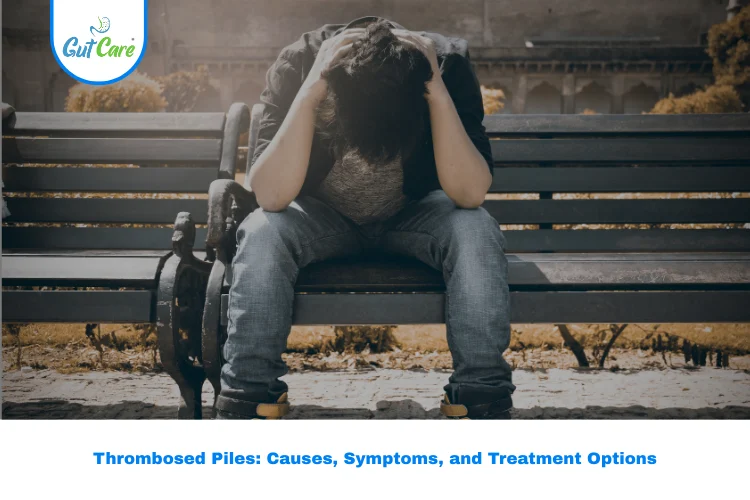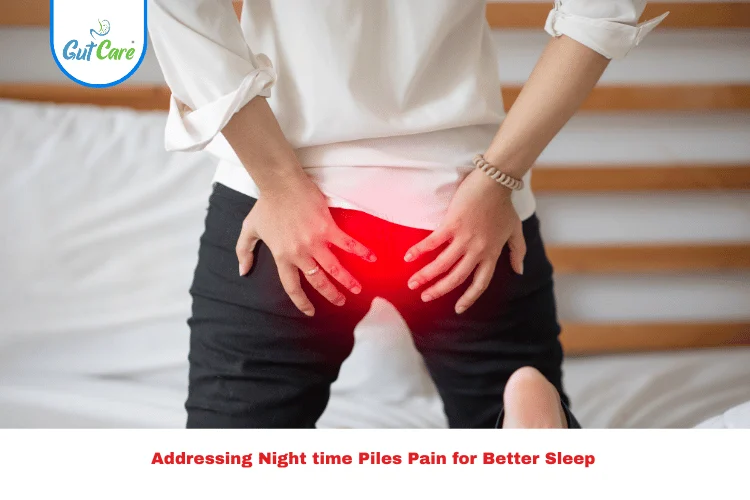Experiencing sudden, painful swelling near the anal area may be a sign of Thrombosed Piles. This condition occurs when a clot forms inside an external hemorrhoid, leading to severe pain and discomfort. At Gutcare Clinics in Bangalore, our expert colorectal surgeon Dr. Yuvrajsingh Gehlot provides specialized piles treatment tailored to each patient’s needs. Understanding the causes, symptoms, and available remedies can help you manage this condition effectively and seek timely care.
What Are Thrombosed Piles?
Thrombosed piles, also known as Thrombosed external hemorrhoids, occur when the veins around the anus develop a clot. Unlike regular hemorrhoids, these are usually more painful, swollen, and tender. While not life-threatening, they can significantly impact daily comfort and require medical attention for proper healing.
Thrombosed Piles Causes
Several factors can lead to the development of Thrombosed Piles. Common piles causes include:
- Straining during bowel movements due to constipation.
- Prolonged sitting on the toilet.
- Pregnancy and childbirth increasing rectal pressure.
- Heavy lifting or intense physical activity.
- Low-fiber diet, leading to hard stools and straining.
Being aware of these triggers helps reduce the chances of recurrence.
Symptoms of Thrombosed Piles
Recognizing the symptoms early allows for faster treatment. Common signs include:
- A hard, painful lump near the anus.
- Sudden severe pain during sitting or walking.
- Swelling and tenderness around the anus.
- Itching or irritation in the anal area.
- Occasionally, bleeding during bowel movements.
If symptoms worsen or do not improve within a few days, consulting a colorectal surgeon is essential.
Treatment Options for Thrombosed Piles
1. Home Remedies for Mild Cases
For less severe thrombosed piles, the following measures may provide relief:
- Warm sitz baths to soothe pain and reduce swelling.
- Topical creams prescribed for pain and inflammation.
- Ice packs to minimize discomfort.
- High-fiber diet to ease bowel movements.
- Staying hydrated to prevent constipation.
2. Medical Piles Treatment
When pain is persistent, professional care becomes necessary. Treatment options include:
- Medication: Pain relievers and anti-inflammatory creams.
- Incision and drainage: A quick procedure to remove the clot and provide immediate relief.
- Minimally invasive procedures: Such as rubber band ligation or laser treatment.
At Gutcare Clinics, Bangalore, Dr. Yuvrajsingh Gehlot offers advanced piles treatments with a focus on long-term relief and patient comfort.
3. Lifestyle and Dietary Changes
Prevention plays a vital role in managing piles. Some steps include:
- Eating a fiber-rich diet with whole grains, vegetables, and fruits.
- Avoiding foods to avoid in piles, such as spicy dishes, fried items, and processed foods.
- Engaging in regular physical activity to promote bowel health.
- Avoiding prolonged sitting, especially on the toilet.
Why Consult a Colorectal Surgeon?
While home remedies may offer temporary relief, recurrent or severe Thrombosed piles require expert evaluation. A colorectal surgeon can assess the severity, recommend the best treatment, and help prevent complications. At Gutcare Clinics, patients benefit from modern technology, compassionate care, and the expertise of Dr. Yuvrajsingh Gehlot.
Conclusion
Thrombosed Piles can be extremely painful but are highly treatable with the right approach. From dietary adjustments and home remedies to advanced surgical care, multiple solutions are available. If symptoms persist, worsen, or significantly affect daily life, consult a colorectal specialist immediately. Gutcare Clinics in Bangalore is committed to providing comprehensive piles treatment and helping patients regain comfort and confidence.
FAQs
1. What are the main causes of thrombosed piles?
Thrombosed piles causes constipation, straining during bowel movements, prolonged sitting, pregnancy, and a low-fiber diet.
2. Can thrombosed piles heal on their own?
Yes, mild cases may improve within a week with home remedies, but persistent pain should be treated by a colorectal surgeon.
3. What foods to avoid in piles?
Avoid spicy food, fried dishes, processed snacks, and low-fiber foods, as they worsen constipation and piles symptoms.
4. How is piles treatment done at Gutcare Clinics Bangalore?
At Gutcare Clinics, treatments include medication, incision and drainage, and minimally invasive procedures, guided by Dr. Yuvrajsingh Gehlot.
5. When should I see a doctor for thrombosed piles?
Seek medical help if pain is severe, bleeding is frequent, or if home remedies do not bring relief within a few days.




